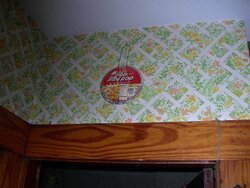A Wife with a sensitive nose.
Sound asleep at 1.50am this morning I hear my wife screaming "Ray, there's lots of smoke, check the fire. I'll get the kids". Instantly my eyes fly open adrenalin starts kicking. Sure as eggs, smell lots of smoke. Bolt out of bed and hands collides with chest of drawers (may have fractured bones in hand) and fly down stairs and toward the stove (VC Encore #2550). A lot of smoke in the living room where the stove is but, thank my luck stars, no fire. That is no fire on the outside of the stove and no fire on the inside of the stove either. Wife screaming at kids to wake them up. I look through the glass doors and "Whump" from the stove and more smoke. Phew, Backpuffing. Open the air, fire picks right up. Call out to wife that all is ok. Kids back to bed, open windows, start freezing, turn on blower to assist in cycling air through the filter. Calm down on the adrenalin.
Prior to going to sleep at 11.30 I had put more wood into the stove and because it was late I didn't allow enough time to "gently" choke the air off and the backpuffing must have started later on and then slowly, through convection, cycled upstairs. In hindsight, I am amazed that the smoke alarms didn't go off (tested regularly, new batteries the works) but they didn't go off. So, after my tale, I know that a couple of firefighters are part of the crew of hearth.com, here is my question. At what point do smoke detectors sound off. In my old house the smoke detector was next to the kitchen and when something got burnt the alarm would sound (rather regularly), yet in this house the smoke detectors are in all the stairwells and the room where the stove is yet the alarm didn't go off. How sensitive are these things.
Alls well that ends well, yet I thought I'd pass my tale on. Don't choke your system down too fast.
Ray
Sound asleep at 1.50am this morning I hear my wife screaming "Ray, there's lots of smoke, check the fire. I'll get the kids". Instantly my eyes fly open adrenalin starts kicking. Sure as eggs, smell lots of smoke. Bolt out of bed and hands collides with chest of drawers (may have fractured bones in hand) and fly down stairs and toward the stove (VC Encore #2550). A lot of smoke in the living room where the stove is but, thank my luck stars, no fire. That is no fire on the outside of the stove and no fire on the inside of the stove either. Wife screaming at kids to wake them up. I look through the glass doors and "Whump" from the stove and more smoke. Phew, Backpuffing. Open the air, fire picks right up. Call out to wife that all is ok. Kids back to bed, open windows, start freezing, turn on blower to assist in cycling air through the filter. Calm down on the adrenalin.
Prior to going to sleep at 11.30 I had put more wood into the stove and because it was late I didn't allow enough time to "gently" choke the air off and the backpuffing must have started later on and then slowly, through convection, cycled upstairs. In hindsight, I am amazed that the smoke alarms didn't go off (tested regularly, new batteries the works) but they didn't go off. So, after my tale, I know that a couple of firefighters are part of the crew of hearth.com, here is my question. At what point do smoke detectors sound off. In my old house the smoke detector was next to the kitchen and when something got burnt the alarm would sound (rather regularly), yet in this house the smoke detectors are in all the stairwells and the room where the stove is yet the alarm didn't go off. How sensitive are these things.
Alls well that ends well, yet I thought I'd pass my tale on. Don't choke your system down too fast.
Ray



